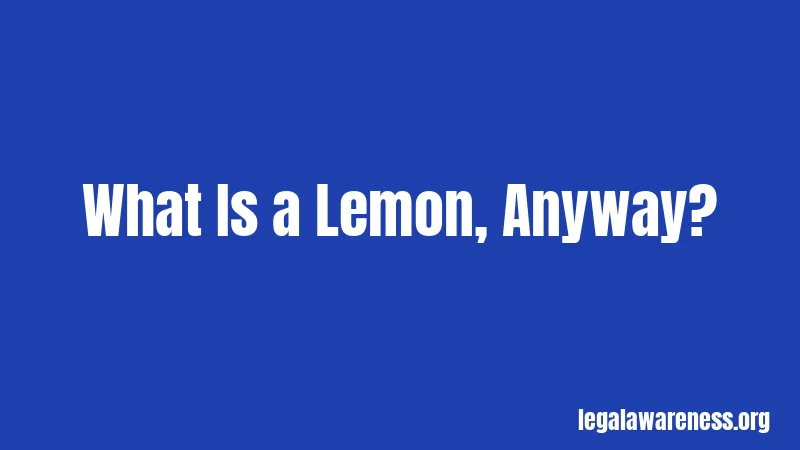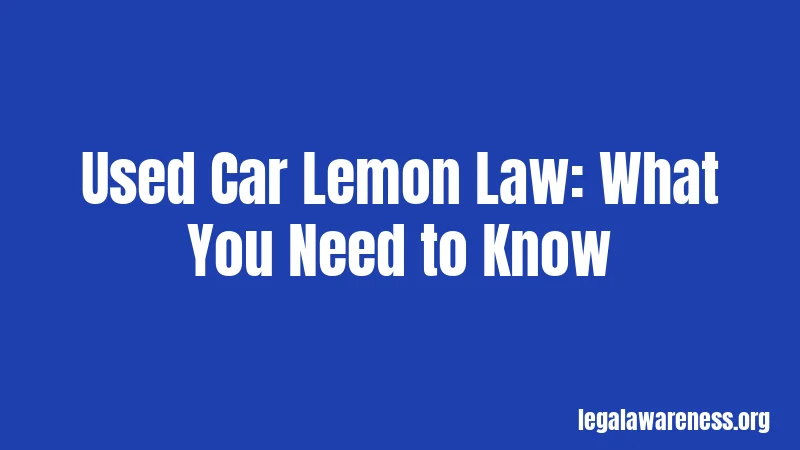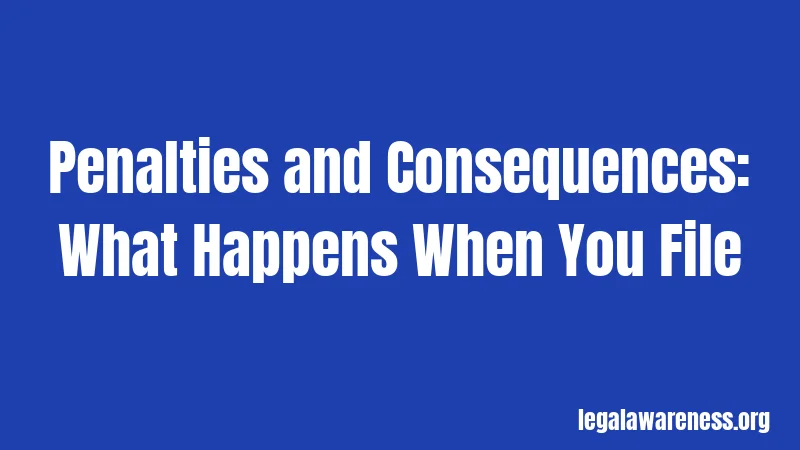New York Lemon Laws in 2026: Your Full Protection Guide
You just bought a car that’s been breaking down constantly. Repairs aren’t working. You’re frustrated. Here’s the thing: if you’re in New York, you might have some serious legal protection. Most people have no idea lemon laws exist or how powerful they can actually be. The good news? This guide will walk you through everything.
New York doesn’t just let dealerships and manufacturers sell you broken cars and walk away. The state has two separate lemon laws that can get you a refund, replacement, or compensation. Honestly, these laws are stronger than most people realize. And you probably qualify.
What Is a Lemon, Anyway?

Think of it like this: a lemon is a car that has serious problems covered by its warranty. The manufacturer or dealer tries to fix the problem. They fail. After multiple attempts, the problem still exists. That’s a lemon.
A “nonconformity” is the official word for the defect or problem. It covers anything that substantially impacts the car’s value. Not every tiny issue counts. But if something is genuinely broken and hurts the car’s value? That counts.
New Car Lemon Law: The Basics
What Cars Are Covered?
Here’s where it gets important. New York covers:
Brand new cars purchased or leased from any dealer. Used cars that are basically brand new. Specifically, cars with less than 18,000 miles and less than two years old. Motor homes (but not their living parts). Demonstrator vehicles.
The car must be registered in New York or purchased here. It has to be used primarily for personal, family, or household purposes. And here’s a catch: it must have a manufacturer’s warranty at the time of original delivery.
You’re probably covered if you bought a car from a New Jersey dealer and registered it in New York. You could even be covered if you received a car as a gift and registered it in New York.
How Many Repair Attempts Make It a Lemon?
Not sure what counts as “reasonable attempts”? Let me break this down.
New York creates a legal presumption after certain thresholds:
Four or more repair attempts for the same problem. The problem still exists after the fourth try? That triggers the presumption. You likely qualify.
Thirty or more days out of service. This is consecutive or not. If your car has been in the shop for a combined total of 30 days during the warranty period, you qualify. Even if one part was waiting to arrive, the days still count (with some exceptions for part unavailability).
Manufacturer’s refusal to repair. If the manufacturer or dealer refuses to repair a substantial problem within 20 days of your certified notice, that’s it. You qualify.
Pretty straightforward, right? One of these three situations puts you in the lemon category.
What’s the Time Limit?
Okay, pause. This part matters a lot. You have a limited window to claim protection.
Your coverage kicks in within the earlier of: 18,000 miles from original delivery, or two years from the original delivery date. Whichever comes first. After that? You’re outside the window.
But hold on. Once you notify the dealer of a problem within this window, they have to repair it. Even if your warranty expires before the repair happens, they still must fix it for free. That’s the law.
Used Car Lemon Law: What You Need to Know

Used Cars Have Different Coverage
The used car lemon law works differently than the new car law. Used cars from dealers get a dealer-provided warranty. This warranty covers specific parts listed by New York.
Here’s the key difference: You buy a used car from a professional dealer (someone who sells three or more cars per year). That dealer must give you a written warranty. Private sales don’t count. If your cousin sold you a car? No protection.
How Long Is the Warranty?
The warranty length depends on the car’s mileage when you bought it. More miles means a shorter warranty.
18,000 miles or less: You might actually be covered under the new car lemon law instead.
Over 18,000 to 36,000 miles: You get 90 days or 4,000 miles of warranty coverage, whichever expires first.
Over 36,000 to 80,000 miles: 60 days or 3,000 miles of coverage.
80,000 to 100,000 miles: 30 days or 1,000 miles of coverage.
Over 100,000 miles: Sorry. No coverage at all.
What Parts Does It Cover?
You’re not alone. This confuses a lot of people. The warranty only covers major components. Here’s what’s included:
Engine parts like the water pump, fuel pump, manifolds, engine block, and cylinder head. Transmission (the case and internal parts). Drive axle housings and internal parts. Brakes, steering systems, and alternators. Starter and ignition system (not the battery).
Wear items? Not covered. Tires wear out naturally. The battery dies eventually. Those aren’t lemon law issues. Also not covered: routine maintenance parts, fluids, seals, and gaskets.
When You Hit 15 Days in the Shop
Let’s talk about something most people don’t expect: the time your car spends getting repaired.
If your used car is in the shop for a combined total of 15 days or more during the warranty period, you can trigger lemon law protection. That’s three or more repair attempts that don’t work. Or 15 days out of service. Either one qualifies you.
Notice how this is different from new cars? New cars need 30 days. Used cars need 15. That’s meaningful.
Penalties and Consequences: What Happens When You File

If the Manufacturer Refuses to Repair
Wait, it gets interesting here. If the manufacturer absolutely refuses to repair a substantial problem within 20 days of your certified letter? You’ve already won.
You can then demand either a full refund or a comparable replacement vehicle. Comparable means the same year and model with similar mileage. If your car is financed, the refund goes to pay off your loan first. You get what’s left. If you leased, the lease terminates. Done.
The Compensation You Can Get
If you win a lemon law case, here’s what you might receive:
Full refund. The entire purchase price. Plus all license and registration fees. Minus a mileage deduction if the car had more than 12,000 miles driven.
Comparable replacement. A car of the same make and model. With approximately the same mileage. Brand new. No extra cost to you.
Cash compensation. In some cases, you keep the car and receive money to offset the decreased value.
Attorney fees and costs. If you win through arbitration or court, the manufacturer pays your legal costs.
Honestly, this is the part most people miss. The manufacturer pays your lawyer.
Special Circumstances: When You Might Not Qualify
Abuse, Neglect, or Unauthorized Modifications
Here’s where manufacturers push back. They don’t have to refund if the problem came from abuse, neglect, or changes you made without permission.
What counts? Crashing the car. Not performing basic maintenance. Adding aftermarket parts. Towing a trailer when the car wasn’t designed for it. Racing the engine.
This doesn’t just mean intentional damage. Neglect counts too. If you skipped oil changes and the engine failed, that’s neglect. Manufacturers can refuse to cover that.
The Problem Doesn’t Substantially Impair Value
Some defects are minor annoyances. One seat isn’t quite comfortable. A door handle looks funny. These don’t substantially hurt the car’s value.
New York specifically says the problem must significantly reduce the vehicle’s value. A paint scratch? Probably not. An engine that barely runs? Absolutely.
Courts look at whether a reasonable person would consider this a major problem. They consider how much the issue affects the car’s use, safety, or resale value.
How to File a Lemon Law Claim: Your Action Plan
Step 1: Report the Problem Right Away
Seriously, do this immediately. Report any defect to the dealer in writing. Keep a copy. Include the date, time, and description of the problem. Be specific.
The dealer must forward your report to the manufacturer within seven days. Always keep documentation. Work orders. Repair bills. Emails. Text messages. Everything.
Step 2: Give the Dealer Reasonable Attempts to Fix It
You need to give them a fair chance. For new cars, that’s typically three to four repair attempts. For used cars, that’s three or more.
Don’t just give up after one visit. Document each visit. If they tell you the problem can’t be reproduced, get that in writing. If they say parts are unavailable, document the delay.
Step 3: Notify the Manufacturer (if needed)
If the dealer refuses to repair or won’t make progress after the reasonable number of attempts, send a certified letter to the manufacturer. Use certified mail with return receipt. Include everything: dates, mileage, repair attempts, what’s still broken.
The manufacturer then has 20 days to address it. If they don’t, you’ve basically won the case.
Step 4: Request Arbitration or File a Lawsuit
You have two paths forward. Both are solid.
Arbitration through the Attorney General: This is free or low-cost. An arbitrator hears both sides. The decision is binding on both parties. It’s faster than court. Most people use this route.
Civil court: You can skip arbitration and go straight to court. This takes longer. But you have the same rights.
To request arbitration, contact the New York State Attorney General’s office. Call 1-800-771-7755. Or email [email protected]. They’ll walk you through the process.
Step 5: Keep Making Your Payments
Here’s something that trips people up. Keep paying your car payment. Or your lease payment. Unless an attorney tells you otherwise, keep those payments current.
If you default, the lender might repossess the car. That could hurt your lemon law claim. It’s counterintuitive, but it matters.
The Attorney General’s Role: Your Free Resource
Trust me, this is valuable. The New York State Attorney General runs a free lemon law program.
They administer arbitration. They protect your rights. If you win, you get attorney fees paid by the manufacturer. You don’t need to hire a lawyer out of pocket if you can’t afford one.
Call the Consumer Frauds Bureau at 1-800-771-7755. They answer questions. They send application forms. They explain your options.
The whole process is designed to help regular people like you. No fancy lawyers required to start.
Frequently Asked Questions
What if I bought the car out of state but drive it in New York? You’re covered if the car is currently registered in New York. It doesn’t matter where you bought it. As long as it’s registered here, the lemon law applies.
Can I file a claim if the warranty has expired? If you reported the problem to the dealer before the warranty expired, yes. Once you notify the dealer, they must repair it. Even if the warranty expires before the repair is done.
What if I financed the car and owe more than it’s worth? You still have rights. If you win a refund, it goes to pay off the loan first. If there’s money left over, you get it. If you owe more than the car’s worth, you’re responsible for the difference.
Can I get a replacement car instead of a refund? Absolutely. You have the choice. You can pick either a full refund or a comparable replacement vehicle. The manufacturer or dealer doesn’t get to choose. You do.
What if the dealer claims the problem is “normal wear and tear”? Document everything. Get their claim in writing. Normal wear and tear is real—tires wear out, batteries die. But actual defects aren’t wear and tear. If something broke prematurely for a defective reason, that’s a lemon issue, not normal wear.
How long does the arbitration process take? Usually three to six months. Sometimes faster. It depends on the complexity of your case. Court cases take much longer. Arbitration is usually faster and less expensive.
Final Thoughts
You have real protection in New York. The lemon laws exist for a reason: to stop manufacturers and dealers from selling defective cars without consequence.
If you suspect your car is a lemon, don’t wait. Document everything now. Report problems immediately. Keep records of every visit, repair, and conversation. The sooner you act, the stronger your position.
You’re not alone in this. Thousands of New York drivers use these laws every year. Call the Attorney General’s office. They’re there to help.
Stay informed, stay organized, and don’t let a bad car become your problem forever.
